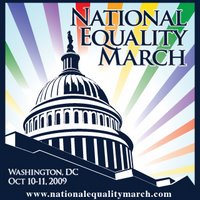National Equality March

Logo for the March
|
|
| Date | October 11, 2009 (National Coming Out Day) |
|---|---|
| Location | Washington, D.C. |
| Participants | lesbian, gay, bisexual, and transgender (LGBT) rights activists and supporters |
| Outcome |
Matthew Shepard Act signed into law (October 22); US President Barack Obama committed to end "Don't ask, don't tell", the US military policy forbidding gays, bisexuals, and lesbians to serve openly |
| Website | www.NationalEqualityMarch.com |
The National Equality March was a national political rally that occurred October 11, 2009 in Washington, D.C. It called for equal protection for lesbian, gay, bisexual, and transgender (LGBT) people in all matters governed by civil law in all 50 states and the District of Columbia. The march was called for by activist David Mixner and implemented by Cleve Jones, and organized by Equality Across America and the Courage Campaign. Kip Williams and Robin McGehee served as co-directors. Leaders like actress Michelle Clunie and New York gubernatorial aide Peter Yacobellis hosted the first fundraiser in the spring of 2010. This was the first national march in Washington, D.C. for LGBT rights since the 2000 Millennium March.
Many groups joined by also organizing other events for the weekend, which coincided with National Coming Out Day on October 11 and marked eleven years since the beating and murder of gay University of Wyoming student Matthew Shepard, which prompted national attention and action to expand hate crime laws.
Equality Across America, which is fiscally sponsored by the non-profit Tides Center, states it intends to develop a network of decentralized organizers from each of the 435 U.S. Congressional districts.
Hundreds of thousands of LGBT rights activists marched on Sunday, October 11, 2009 from the White House to the Capitol, demanding that President Barack Obama keep his promises to allow gays to serve openly in the military and work to end discrimination against LGBT people. Many organizers were outraged after the passage of California's Proposition 8, which overturned the right of gays to get married in that state, and over perceived slights by the Obama administration. Though there were no official crowd estimates, mainstream media outlets estimated as many as 200,000 people participated. Unlike the first national LGBT march in 1979 and others in 1987, 1993 and 2000 that included celebrity performances and drew as many as 500,000 people, the event was driven by grassroots efforts and was expected to be more low-key.
...
Wikipedia
